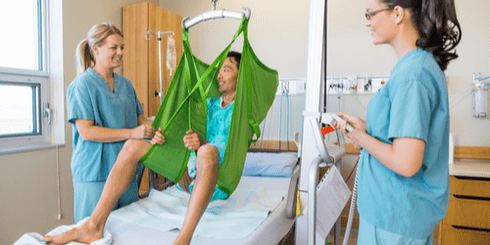
Home » Nursing Careers » Ambulatory Care Nurse
Ambulatory Care Nurse
- Updated March 17, 2023
- by EveryNurse Staff

Ambulatory care nursing is an impressive and essential specialty within the healthcare industry. As a nurse specializing in ambulatory care, you’ll be able to provide high-quality patient and family services ranging from preventative visits to ongoing treatments for chronic illnesses – enhancing the lives of individuals and families while making meaningful contributions to your community through improved health outcomes. To become an ambulatory care nurse, you will need to fulfill specific training requirements as well as adhere to licensing regulations that can vary depending on the state or region.
What Is an Ambulatory Care Nurse?
Definition of Ambulatory Care Nursing
To gain an understanding of ambulatory care nursing (ACN), it’s important to understand its key components. ACNs practice independently while adhering to protocols established by doctors and prioritize overall wellness through preventive services such as screening tests, patient education programs, and other services so individuals can continue managing their own chronic conditions over time.
Furthermore, treatments are offered in outpatient settings outside of hospitals/long-term stays which offer less costly options due to shorter recovery periods along with decreased risks associated with invasive procedures when no postoperative monitoring is needed.
Role of an Ambulatory Care Nurse
In addition to treating acute issues related directly back to illness, ambulatory care nurses serve numerous other roles including serving those who need routine checkups or follow ups on previously existing problems. Additionally, they are responsible for providing direct patient care through activities such as ordering tests, monitoring vital signs, and administering medications.
ACNs might also provide primary-level psychological support by listening to patients’ concerns while motivating them towards healthier living choices or inspiring the implementation of new habits (i.e., diet/exercise) to help manage chronic diseases.
What Does an Ambulatory Care Nurse Do?
An Ambulatory Care Nurse is responsible for a variety of tasks, including:
- Taking health histories to assess overall well-being and building trusting relationships with patients.
- Collecting specimens and reviewing lab results in order to accurately monitor changes in conditions or outcome tests.
- Measuring vital signs and informing physicians about any discrepancies found within this data that could potentially have an effect on treatment plans going forward.
- Creating individualized treatment plans tailored toward each patient’s needs/goals.
- Providing primary-level psychological support by listening to all concerns posed while motivating them towards healthier living choices.
- Educating patients about their plan of care – emphasizing the importance of preventative services like immunizations
What Are the Requirements for Becoming an Ambulatory Care Nurse?
The primary requirement for becoming an Ambulatory Care Nurse (ACN) is having a valid nursing license at the LPN or RN level, depending on your jurisdiction’s regulations. This includes completing any state-mandated continuing education courses each year and having the ability to work independently with excellent communication skills for interacting effectively with patients who may need additional emotional support due to medical or personal issues.
It also requires a strong knowledge base of patient care in order to identify potential risks, accurately monitor vital signs, and write up detailed notes about treatments/care goals going forward – all while maintaining professionalism when interacting with colleagues & customers regularly throughout shift hours. Additionally, ACNs must be knowledgeable regarding applicable laws so they can adhere closely to legal boundaries when treating individuals regardless of if it’s physical health-related concerns versus mental/emotional ones; this helps ensure quality services are always offered.
Educational Requirements
In order to become an ACN, a minimum of an associate degree in nursing (ADN) is required; however, many employers prefer individuals with at least a bachelor’s level knowledge base – meaning they may have acquired either a BSN (Bachelor of Science in Nursing) or even higher graduate degrees like MSNs (Master of Science in Nursing). Additionally, some states also now allow registered nurses the option of obtaining specialty certifications such as CCRN that demonstrates competency within the chosen field through particular exams/tasks taken after completion of certain coursework.
Licensure Requirements
Once educational requirements are satisfied, one will still need visit their state Board of Nursing website in order to apply for licensure which generally entails completing paperwork along with submitting official transcripts from any prior nursing programs attended – if applicable.
Depending on jurisdiction there might be other necessary components such as background checks and/or fingerprinting so please double-check specific rules before registering for classes if interested in pursuing this career track. For more information about Ambulatory Care Nurse licensing by state, we recommend visiting the American Nurses Credentialing Center website.
Related RN Careers
Ambulatory Care Nurse Jobs
As an ambulatory care nurse, you have numerous job opportunities to choose from. Depending on your interests and experience, consider the following roles:
Physician Office Nurse
Urgent Care Nurse
As an Urgent Care Nurse, you’ll be responsible for ensuring quick and efficient operations in a busy urgent care facility. Your primary job duties will include performing triage; treating minor illnesses/injuries such as sprained ankles or flu-like symptoms; administering medications when needed; ordering tests, and X-rays, and scheduling necessary follow-ups for long-term care. Additionally, you may provide routine services such as vaccinations or physicals depending on the needs of each individual patient.
Telehealth/Telemedicine Nurse
Telehealth/telemedicine nurses have seen an increase in popularity as it allows patients to receive quality care from remote sites, eliminating the need for travel for nonemergency-related services. As a Telehealth/Telemedicine Nurse specializing in ambulatory care, your primary responsibility will be connecting with patients via video chat and online messaging apps and then conducting virtual assessments so you can diagnose and treat acute issues over time. You’ll also need to document patient health history on computerized charting software afterward.
Patient Coordinator/Patient Advocate
When individuals require dialysis, chemotherapy, or infusion therapy outside of a traditional hospital setting, they may benefit from speaking with multiple patient coordinators/advocates made available to help guide them through the process. These advocates strive to ensure their needs are met every step of the way while providing comfort and support during times of uncertainty, stress, or physical limitations – all allowing for a smooth transition when transitioning back into daily living activities following the completion of treatment plans.
Ambulatory Surgery Center (ASC) Director of Nursing
Home Health Care Nurse
As a home health care nurse, you’ll provide high-quality patient and family services in the comfort of their own homes. You will be responsible for assessing patients’ conditions through observation and evaluation to develop nursing interventions that meet the individual’s needs. Your duties may include monitoring vital signs, administering medications, providing wound care treatments, educating patients about self-care practices such as nutrition and exercise or assisting with physical therapy exercises when needed.
Additionally, you may offer emotional support by listening to your patient’s concerns while guiding them towards healthier living choices – all while ensuring quality services are provided safely within each client’s residence setting going forward.
What Are the Benefits of Working as An Ambulatory Care Nurse?
Upon entering this profession, one of the primary benefits to consider is job stability – ACNs are often in high demand within hospitals/clinics due to their expertise and special skills. Another potential perk includes a great work-life balance since many ambulatory care settings offer flexible hours which allows for an ideal mix between career success and personal life. And lastly, with increasing numbers of uninsured or low-income individuals accessing healthcare services each year – having access to onsite resources (such as labs) can make providing quality care more cost-effective going forward.
Ambulatory Care Nurse Salary
Ambulatory care nursing pay rates vary across states; however according to salary information sourced from Indeed’s database (2020), average salaries range anywhere from $56k-$80k per annum depending upon years of experience along with current positions held at particular locations. Salaries also tend increase based off special certifications obtained such as those through AACN or AANP so please do research beforehand if interested obtaining additional credentials.












